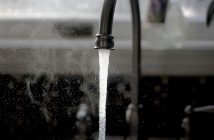
Little choices in kitchens and bathrooms turn into expensive service calls. A sink that drains slowly today becomes a flooded cabinet next month. Tenants and homeowners leave small clues everywhere: grease-streaked pans in the dishwasher, “flushable” wipes in the bin, blue crystals of drain cleaner under the sink. Plumbers fix symptoms, yet daily routines decide whether pipes stay clear and fixtures last. Tweak a few habits now, and the building stays dryer, quieter, and far less stressful.
Fats And Grease That Solidify In Your Pipes
Hot oil looks harmless as it swirls away with a blast of water. Minutes later, it cools, congeals, and grips the inner wall of the line. You protect your drains by scraping pans into the trash or a catch jar first. You should dispose of cooking oil properly in a sealed container that goes to a recycling station or the trash, since that sticky film grows with each rinse. Cold water turns drips into beige wax that catches crumbs and hair, and the mix narrows the pipe like plaque in an artery. It triggers backups and foul odors that upset neighbors and attract fines. Keep a countertop jar, let the oil cool, and toss the solid mass on collection day.
Garbage Disposals That Eat The Wrong Stuff
A disposal works as a small grinder, not a wood chipper. Treat it as a convenience for crumbs, not a chute for everything left on the cutting board. Fibrous peels, stringy celery, and corn husks wrap knives and stall motors. Starchy foods like rice and potatoes swell and turn into a paste that binds with grease. Coffee grounds feel gritty and settle in traps and horizontal runs. Run plenty of cold water before, during, and after a short grind cycle to push particles down the line. Ice cubes help remove residue from the chamber, and a light citrus rinse keeps odors in check. Keep bones, fruit pits, and shell fragments out of the chamber to protect the impeller and prevent sparks from a jammed motor.
“Flushable” Wipes That Don’t Break Down
Marketing copy on wipes suggests quick dispersion in water. Lab tests show a different picture. A 2019 study in Water Research found many labeled wipes kept their integrity long after toilet paper dissolved, which means sheets can snag on rough pipe joints and form ropes that trap other debris. Toilet paper breaks apart fast and slides through bends with the water slug. Wipes, feminine products, cotton swabs, dental floss, and paper towels behave like fabric. One flush might work, then repeated use builds a braid that hooks just behind the closet bend. Clear signage in shared homes or rentals helps, and a small covered bin near the toilet removes temptation. If a mistake happens, stop the habit immediately and clear the pipe with a proper auger before it hardens into a stubborn plug.
Hair, Soap Scum, And Hot Showers That Load The Trap
Shower drains collect shed hair every day. Shampoo and body wash leave a sticky film that glues strands to the drain grate and the top of the P-trap. A simple mesh screen catches most hair before it travels, and fifteen seconds of cleaning after a shower makes a huge difference. Keep a small brush under the sink and scrub the visible ring on the drain once a week. Rinse with hot water for thirty seconds after you finish grooming to melt residue, then finish with warm water to reduce rapid contraction in older metal pipes. If you shave in the shower, capture clippings in a small cup of water and pour them into the trash.
Chemical Drain Cleaners That Scar Pipes
Bottled drain openers seem fast and cheap. Strong formulas generate heat and gas, and that reaction can deform plastic traps and score the inner wall of copper. The gunk might move this time, yet the rough surface left behind will grab the next clump. Vapors linger in cabinets and can trigger headaches in tight spaces. Choose mechanical methods first: a plastic hair snake, a hand auger, or a removable trap with a bucket underneath. If a kitchen sink slows, empty the cabinet, set a towel and a shallow pan, and remove the trap to clean it at a workbench. Reassemble with fresh washers and hand-tighten the nuts. A plumber’s auger through a cleanout clears deeper sludge without harsh chemistry, and the line stays smoother after the job.

Small routines steer plumbing health more than brand-new hardware. Keep fats out of sinks, feed disposals only what they handle, and treat toilets like drains for waste and tissue alone. Choose mechanical clearing methods before chemicals, find and fix tiny leaks, and set simple service intervals for heaters and washers. With steady practices that fit daily life, pipes stay clear, fixtures run quietly, and the budget goes to upgrades instead of emergencies.


